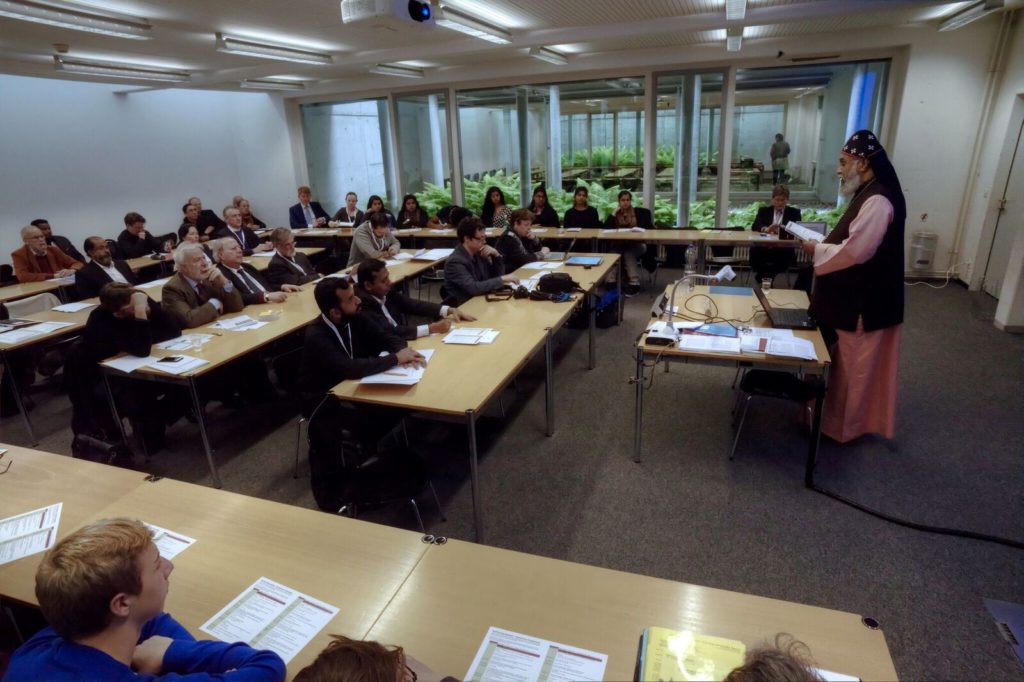In 2016 the national synod of the Old Catholic Church of Switzerland asked the Department of Old Catholic Theology at the University of Bern to hold a conference to promote the reception process for the Old Catholic dialogue with the Mar Thoma Syrian Church of Malabar, India. The conference, titled Indian and European Christianity in Dialogue: Ecumenical Relations between Mar Thoma and Old Catholic Churches as a Source of Intercultural Learning, took place in Bern on 5-6 May 2017.
The first day was given to theological discussion and reflection. In all of their bilateral ecumenical dialogues, the Old Catholic Churches attach great importance to considering the position of the other churches with which it is in dialogue. Speakers from the Anglican, Orthodox and Roman Catholic Churches were therefore also invited to the conference (regrettably, no representative of the Church of the Sweden was able to attend). Members of the Orthodox-Old Catholic International Working Group participated as well, playing an active part in the discussions. Intercultural learning was a focal point from the start: Anglican theologian Professor Douglas Pratt from New Zealand began with a paper on receptive ecumenism, or treating ecumenical dialogue primarily as a learning process rather than a way of convincing the other church of one’s own opinions.
Professor emeritus Urx von Arx from the Department of Old Catholic Theology, and the Roman Catholic fundamental theologian Professor Barbara Hallensleben from Fribourg, addressed the compatibility of ecumenical dialogues: Do different dialogues follow the same ecclesiological approach? While responding positively to the Old Catholic/Mar Thoma dialogue texts, they also noted that the texts’ depth of theological reflection did not quite compare with that of documents from other ecumenical dialogues. Bishop Dr. Harald Rein from the Swiss Old Catholic Church and Revd. Dr. Joseph Daniel from the Mar Thoma Church examined the transitivity of ecumenical relations. In the past, Old Catholics were prepared simply to follow into relationships of full communion that the Anglican Communion had established with other dialogue partners, as in the case of the Philippine Independent Church. That has now changed. If the Old Catholic Churches and the Mar Thoma Church are each in full communion with Anglicans, it does not necessarily follow that they are in full communion with each other – but they certainly need to be in dialogue.
The role of ecumenical councils was addressed by three speakers: Mar Thoma theologian Revd. Shiby Varghese, Old Catholic dialogue commission member and conference co-organiser Dr. Adrian Suter, and Orthodox postdoctoral assistant Dr. Stefanos Athanasiou from the Department of Old Catholic Theology. They provided a range of perspectives on how churches can enter into dialogue or communion if they do not recognise the same number of ecumenical councils as binding.
 The ecumenical guests had the opportunity to experience Old Catholic liturgical spirituality at vespers at St. Peter and Paul, where the Austrian bishop emeritus Dr. John Okoro held a brief meditation. The service was followed by a drinks reception at the church. The conference speakers were the guests of the Old Catholic congregation in Bern for dinner afterwards.
The ecumenical guests had the opportunity to experience Old Catholic liturgical spirituality at vespers at St. Peter and Paul, where the Austrian bishop emeritus Dr. John Okoro held a brief meditation. The service was followed by a drinks reception at the church. The conference speakers were the guests of the Old Catholic congregation in Bern for dinner afterwards.
The second day of the conference was open to a wider audience. Among the attendees were synod delegates from the Old Catholic Church of Switzerland, Indian students in Switzerland, and a group of confirmation candidates from the Bern congregation. The morning began with a film about the Mar Thoma Church. After that, speakers offered insights not only into the Mar Thoma Church itself, but also its wider context in India in contrast to the western and central European contexts in which the Old Catholic Churches are at home. Bishop Dr. Isaac Mar Philoxenos outlined the pastoral and mission challenges facing the Mar Thoma Church in India today and how it is responding with a broad range of social projects. The Old Catholic theologian and social scientist Professor Franz Segbers offered insights into the global socio-economic context as a basis for dialogue between churches. Church historian Professor Klaus Koschorke spoke about the admiration of the Protestant elite for the St Thomas Christians at the turn of the 20th century.
In the afternoon the participants divided into two groups for further discussion. Professor Peter-Ben Smit described how his own encounters with the Mar Thoma Church had opened up new ways of interpreting certain New Testament texts. Steffen Emde outlined the diverse relations between India and the German-speaking countries through history. Revd. Sam T. Koshy examined the dialogue between the Mar Thoma Syrian Church and the Old Catholic Church in the context of the World Council of Churches’ document “The Church: Towards A Common Vision”. Miriam Schneider led a discussion on what ecumenical dialogues can learn from interreligious studies.
In addition to the presentations and opportunities for further conversation in the coffee breaks, the conference participants also had the chance to raise questions during a concluding panel discussion with Bishop Dr. Isaac Mar Philoxenos and Bishop Dr. Harald Rein, moderated by Professor Angela Berlis. Dr. Adrian Suter posed questions that the groups had collected during the day on their behalf.
also had the chance to raise questions during a concluding panel discussion with Bishop Dr. Isaac Mar Philoxenos and Bishop Dr. Harald Rein, moderated by Professor Angela Berlis. Dr. Adrian Suter posed questions that the groups had collected during the day on their behalf.
The members of the dialogue commission who attended the conference agreed to arrange a meeting in summer 2018 to discuss in more detail some of the questions arising in Bern. Possible subjects include the reception of ecumenical councils in the light of documents from other dialogues between Chalcedonian and non-Chalcedonian churches; responses to challenges posed by social issues (e.g. the position of women in the church, homosexuality, the global economy); and how churches in communion live out their relationship in practice.
Adrian Suter

